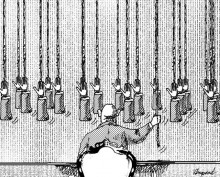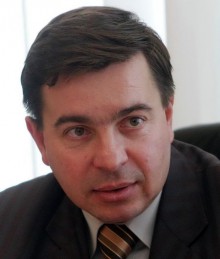Past week Ukrainian public figures, politicians, diplomats, and intellectuals (including Volodymyr Vasylenko, Viktor Shyshkin, Taras Stetskiv, Stepan Khmara, Bohdan Yaremenko, and Oleh Bereziuk) presented their appeal to the president and Verkhovna Rada of Ukraine. In it, they urged not to back constitutional changes in what concerns the “peculiarities of local government” in certain raions of Donetsk and Luhansk oblasts.
Yet this issue is by far not so simple and clear, nor is Ukraine’s current position in international talks. It is the result of government’s systemic mistakes, which brought Ukraine’s troops to the Ilovaisk and Debaltseve pockets, and the entire state to the Minsk “diplomatic pocket.” On the one hand, the abovementioned constitutional changes result from the Minsk accords, which today remain effectively the only instrument for peaceful settlement. Moreover, our Western partners insist on passing the amendments. However, their standpoint is not quite clear, principled, and consolidated either. For instance, recently Germany’s Foreign Minister Frank-Walter Steinmeier spoke about the necessity of a meeting between military representatives of opposing parties in the Donbas with the OSCE, in order to discuss the withdrawal of weapons, because the situation in the region is dangerous. It means thus forcing Ukraine to engage in negotiations with terrorists. In fact, this is Putin’s old-time dream: to pretend that the conflict in Ukraine is just a “civil war,” and not the result of Russian aggression. In addition (and The Day has emphasized this multiple times), under the current circumstances of Russian aggression and occupation, amending the Constitution or decentralizing both jeopardize Ukraine.
Are there any alternatives to this constitutional deadlock? What kind of goal pursued the authors of the appeal to the president and parliament? Won’t their initiative turn into another factor of destabilization in Ukraine? The Day interviewed one of the authors of the appeal, former Member of Parliament, development director at the Center for Political and Legal Reforms, Taras STETSKIV.
“This appeal was initiated by myself, Volodymyr Vasylenko, Mykhailo Basarab, Viktor Shyshkin, and Stepan Khmara. Our remarks concern the legislative establishment of the ‘special status’ for the occupied territory of Donbas in Ukraine’s Constitution. This is an unconstitutional norm which is forced on Ukraine by Putin. He has been pushing it through both Minsk accords, in order to impose the ravaged Donbas back on Ukraine, enshrine its ‘special status,’ and thus disunite the Ukrainian state. This would effectively give him the right to veto the European drive and undermine Ukraine’s domestic reserves through forcing Ukraine to finance the occupied territories. This is unacceptable. The entire constitutional process, which has been hastily launched on March 5 with the creation of the Constitution Commission, is not the result of the inner, sovereign will of the Ukrainian people or its Verkhovna Rada, but open-faced arm-twisting and pressure from outside, and not only from Russia.”
Do you have an action plan?
“The body of the appeal rests on the legal proposal that Ukraine is objectively in a state of war. In fact, we provided the MPs with an argument for a well-grounded rejection of all those proposed amendments to the Constitution in the first reading on August 25, so that they could be postponed till hostilities with Russia are over. We have given the parliament the tip for at least several possible ways to act. They allow to get out of the horrendous situation the Minsk accords have driven Ukraine in, and struggle out of the diplomatic trap in which Ukraine finds itself after signing the accords.
“Firstly, the Rada could leave the amendments out of the agenda, and secondly, it can reject the amendments proposed by the president, despite the ruling of the Constitutional Court. Generally speaking, we are utterly against amending the Constitution: it is at least premature to decentralize power in a war-torn country. But if the Verkhovna Rada, urged by the president, is so anxious to implement that decentralization and launch the administrative reform, let them at least eliminate Paragraph 18 of the Transitional Provisions. Then the parliament can use this loophole to send the revised draft amendments to the Constitutional Court. The ultimate approval could be given in spring 2016. And it would be a right thing to do for Ukraine, because it need not hurry to change its Constitution in order to please the Russian aggressors, or conform to demands from the West. Russia will not stop its intervention, so this would be a policy of unilateral concessions, and should Ukraine follow this path, it will arrive at the same result which Hetman Mazepa got in his time: defeat.”
Have the MPs changed their opinion after the constitutional amendments were sent to the Constitutional Court of Ukraine?
“According to the information I have at my disposal, today there are no 300 votes ‘for,’ and therefore our appeal is meant to consolidate this position. Our goal is to ensure that these 300 votes never be garnered, and we are working with the MPs.”
Incorporating of this paragraph into the Transitional Provisions to the Constitution results from the Minsk accords and is a step towards the peaceful settlement of the conflict in international negotiations. Is there an alternative to it? In fact, we have no other peaceful settlement tools, do we? Moreover, this policy is backed by the West, the US in particular. It should be remembered that we depend on our Western partners economically, politically, and militarily.
“Petro Poroshenko thinks that there are no alternatives to the Minsk process, but I believe there are some. In our opinion, Ukraine should leave the Minsk format and conclude other treaties, which would be more advantageous for our country. I assure you that should Ukraine demonstrate its sovereign will and eliminate the ‘special status’ of Donbas from the Constitution, and given that Russia has hundreds of times violated the Minsk accords, a different reality will arise, and different negotiations will follow. I assure you that the Western nations will support this reality. There is no need to explain to the West that Ukraine cannot trade its sovereignty for some ‘special status’ in its Constitution, which will never bring it peace. We cannot accept such ignominious terms, it would be easier to cut Donbas off, for otherwise we let Putin into our domestic policy. So, we need to eliminate Paragraph 18 of the Transitional Provisions and immediately propose the Western countries a different format of negotiations, and different peace terms. We must not fear this, or give in to Russia’s arm-twisting and threats of them launching a large-scale invasion. They will not do it, this is bluffing which, sadly, has been giving Ukraine the creeps all this year long.
“I have often heard scary stories (disseminated, among others, by pro-presidential journalists) that in case of elimination of Paragraph 18, the international coalition to support Ukraine would collapse. The international coalition will not collapse because the West is pragmatic, it proceeds from the standpoint of Ukraine’s government. If Ukraine’s position is shaky, our partners behave correspondingly. Meanwhile, our state must be guided by the need to preserve our sovereignty.”
But this “hard line” must be based on something. Do we have an adequate foundation for it?
“Today we have the army, and the most eloquent evidence is the front line, which stays where it has been. Otherwise, it would run along the Dnipro. The West must understand Ukraine’s sovereign position, and the will of the president and the Verkhovna Rada. In their turn, these latter two must, besides singing the national anthem and quoting Shevchenko, demonstrate a clear-cut standpoint.”
But the paragraph about the “peculiarities of local self-government” is included in the Transitional Provisions, which means it is temporary.
“The Transitional Provisions make up the permanent body of the Constitution. In a likewise ‘temporary,’ provisional manner we have fixed the status of the Russian Federation’s Black Sea Fleet.”
If the Verkhovna Rada does vote for these constitutional amendments, what will your further actions be like?
“Any attempts at arm-twisting within the parliament, to make MPs give 300 votes for the amendments, would trigger the creation of a patriotic national opposition to the incumbent government, regardless of our initiative, in lieu of the pro-Kremlin Opposition Bloc. In our document we wanted to send a warning about it, because this process is already underway in Ukraine. Most likely, it will be a broad amalgamation of various organizations, which would employ all available means, from petition signing to street actions to pickets and rallies, to pressurize the Verkhovna Rada and prevent such amendments to the constitution. There will be enlightenment work in order to explain to Ukrainian society that the ‘special status’ is a threat to Ukraine’s existence.”
Wouldn’t such a protest movement become another destabilizing factor in the country, which will play into the aggressor’s hands?
“If it is broad, patriotic, intelligent, and constructive, such a movement will not unsettle the situation. But no one will close their eyes to the fact that the government is harming the national interests. The point of our appeal and of this very movement is to make the government hear the civic society. We are prepared to back the government, but we ask them not to undermine Ukraine’s interests. And if we get heard, the situation will change, and the problem will be solved.”









